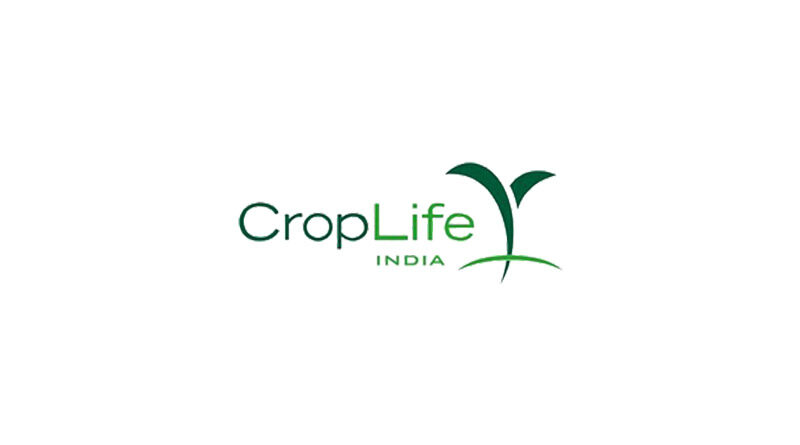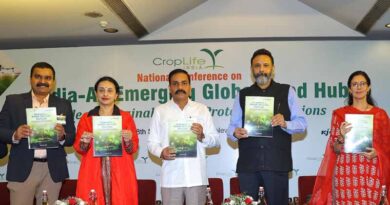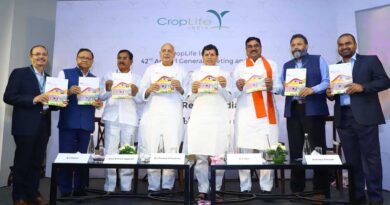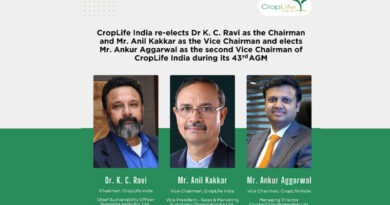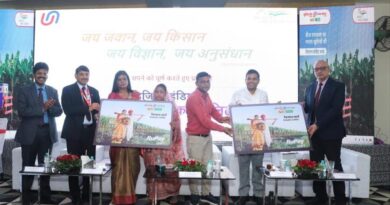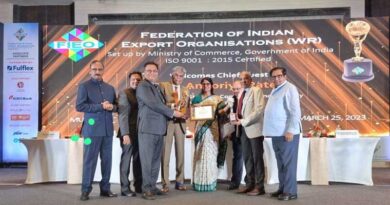Government & Agro-chemical Industry Leaders deliberate on Agrochemicals – The Road Ahead during AGM of CropLife India
“Stable policy environment and supportive regulatory system will nurture innovations and help Indian farmers”
13 October 2020, New Delhi, IN: CropLife India; a leading association of 15 R&D driven crop science companies organized its 40th Annual General Meeting, which witnessed the congregation of the Hon’ble Minister of State for Agriculture, senior Government officials, experts and industry captains on the cause of supporting the farmer.
Also Read: Bayer helping transform the food system through innovation in agriculture
The Open House – Virtual Conference, included an Inaugural Session, “Policy level changes required to make Agrochemicals, a Champion sector”; a Panel Discussion on “Policy & Regulatory Roadmap for Agrochemicals Sector” and a Valedictory Session.
Mr. Parshottambhai Rupala, Hon’ble Minister of State, Ministry of Agriculture and Farmers Welfare, shared that “India considers agro-chemical as a champion sector and is all set and open to align this sector with Best International Practices and Regulatory Reforms; by reducing registration timelines of crop protection products”.
Mr. Rupala added, “The crop protection industry should share propositions to make crop protection products which are newer, safer and more effective, for the benefit of the farmers. The Government is also looking at a cluster approach for imparting quality education and extension services for the farmers and Industry should support this initiative”.
Dr. Ashok Dalwai, CEO, National Rainfed Area Authority, Ministry of Agriculture and Farmers Welfare, opined, “The impact of climate change has a direct/indirect fallout on pests, which creates impact on crops. Prime Minister said, we need to be ‘Aatmanirbhar’, which would mean positioning ourselves in the global market as the new workshop for the world. We should consider the following dimensions for the roadmap: taking care of end consumers, taking care of the farmer’s interest, concern for country’s employment and ecological needs – biodiversity”.
Also Read: Corteva Agriscience to Participate in 2020 Borlaug Dialogue at the World Food Prize
Dr. Dalwai added, “India has a virtuous infrastructure and regulatory system to promote. India needs to be the market hub, to be in the national market. Going forward, globally accepted policy incentives e.g. data protection, digital technology , e.g. drones and services solutions from industry and channel partners will help achieve our goals”.
Mr. Samir Kumar Biswas, Additional Secretary, Dept. of Chemicals & Petrochemicals, Ministry of Chemicals & Fertilizers congratulated the industry on this momentous occasion and shared, “Government and Industry would work together to bring the recommendations and international best practices, to achieve national goals”.
Dr. S. K. Malhotra, Agriculture Commissioner, Ministry of Agriculture & Farmers Welfare said, “India needs new molecules, which are safe and effective. Industry needs to come forward & submit the list of such molecules, including higher active ingredients; aligned with International standards; which will be welcomed. The Government appreciates industry’s contribution against fight against invasive pests.”
Mr. Salil Singhal, Chairman Emeritus, PI Industries moderated the panel discussion, and Mr. John Southwell, Counsellor (Agriculture), Australian High Commission in India presented the Australian Government’s regulatory ecosystem.
Also Read: AlgaEnergy co-leads two new EBIC Project Teams
Dr. K. C. Ravi, Chairman, CropLife India shared that the need for a predictable, stable and science based policy and regulatory regime for the proper growth of the crop protection sector is imperative. A forward looking progressive Pesticide Management Bill 2020, which promotes innovation and new product introduction to address the current and upcoming challenges faced by farmers; while paving the way with introduction of cutting edge technologies like Artificial Intelligence and Drones. CropLife India outlined a four point agenda to the Government.
Mr. Asitava Sen, CEO, CropLife India while welcoming all participants opined that, “India is the 4th largest producer of agrochemicals in the world and looking at the potential the Government of India has declared it as one of the 12 Champion Sectors, where India can be a critical player in the global supply-chain. This transformation will require close partnership between the Government, the industry and the farmers. CropLife India is committed to support Hon’ble Prime Minister of India’s vision of Doubling Farmers Income by 2022”.
The CropLife India Members unanimously elected the new office bearers: Dr. K. C. Ravi, Chief Sustainability Officer, Syngenta India Ltd. as Chairman and Mr. Sanjiv Lal, MD & CEO, Rallis India and Mr. Anil Kakkar, Vice President – Sales & Marketing, Sumitomo Chemical India Ltd. as Vice Chairmen of the Board of Directors for CropLife India; during the Annual General Meeting.
Crop Protection Industry has played a major role in ensuring food and nutritional security of the nation besides making us one of the key agricultural output countries in the world. Challenges are getting complex with invasion of new pests; build-up of resistance; climate change and associated vagaries of weather.
CropLife India members are not only committed to bring latest and safer innovations and are equally committed to educate farmers on their safe and responsible use. CropLife and its member companies have always believed in a constructive partnership approach with the Government and would like to continue to contribute in creating a science-based, pragmatic and stable regulatory environment.
CropLife members continue to work closely with farmers, scientific community and policy makers to address current as well as future challenges. However, cost of research has gone up and it is estimated that the cost of discovery and development of a new active ingredient is around $286 million. If Indian agriculture must flourish, be more competitive, quality driven, reducing wastages as well as losses to enable our farmers to be more successful, it is absolutely essential that a progressive policy environment is in place that fosters innovations.

